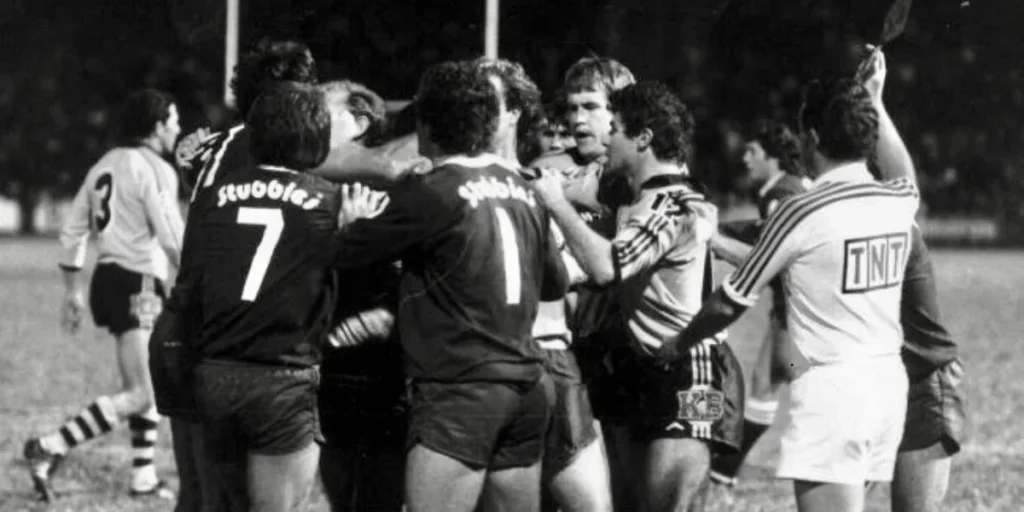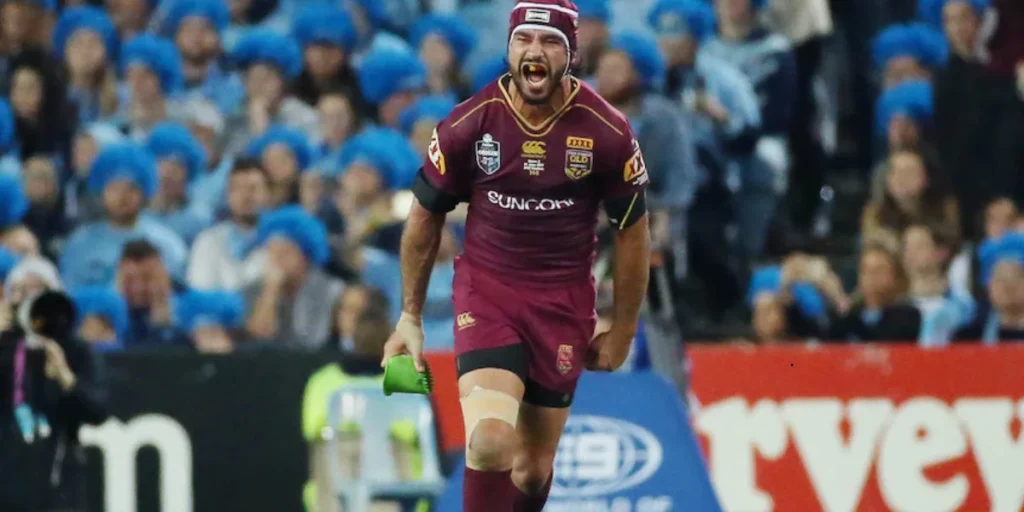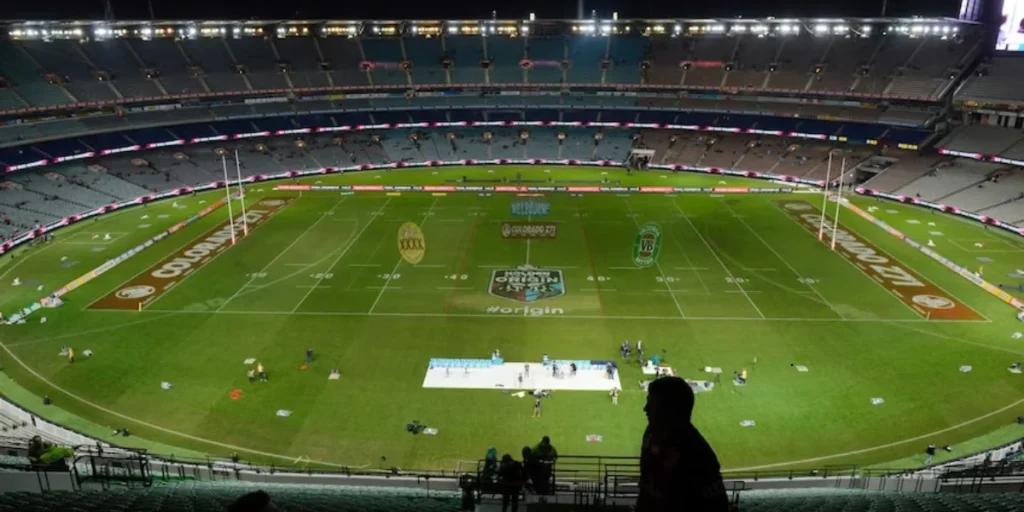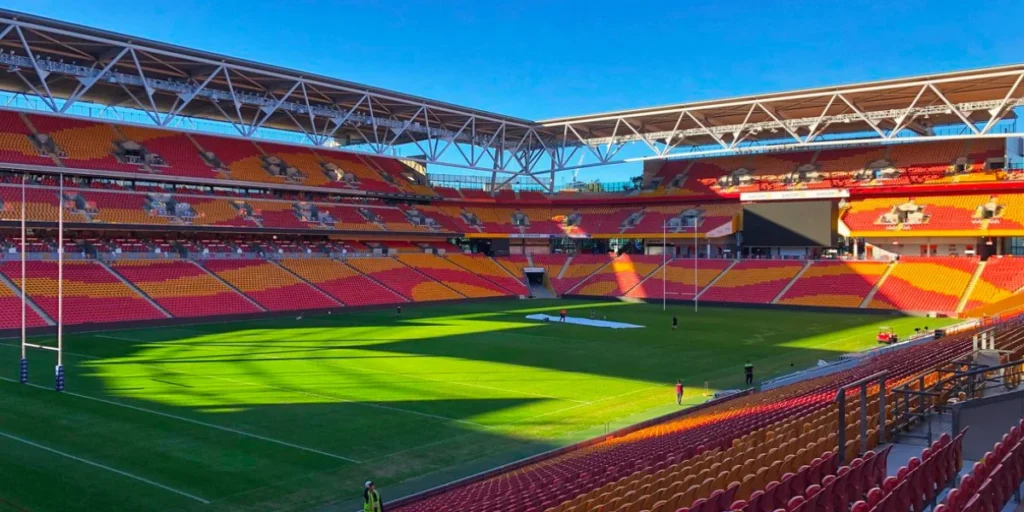The State of Origin series stands as one of rugby league’s most fiercely contested competitions, with Queensland dominating the overall tally with 26 series victories compared to New South Wales’ 17 since its inception. Officially beginning in 1980 with an experimental match, the complete series format was established in 1982, creating what would become an iconic sporting rivalry in Australian culture. Throughout its history, 132 matches have been played, with Queensland winning 70 games and New South Wales claiming 60 victories, alongside two draws.
Queensland’s impressive dominance includes a record streak of 8 consecutive series wins from 2006 to 2013, while the biggest State of Origin win occurred in 2015 when Queensland demolished New South Wales 52-6, establishing a 46-point margin that remains unmatched. The series has attracted massive crowds throughout its history, with the biggest State of Origin crowd reaching 91,513 spectators at the Melbourne Cricket Ground during Game II of 2015.
Additionally, the competition has produced legendary players like Cameron Smith, who holds the record for most appearances with 42 games, and Greg Inglis, whose 18 tries make him the greatest try-scorer in state of origin history. From its experimental beginnings in 1980 to the modern era, this article explores the complete statistical history of rugby league’s greatest interstate rivalry.
The Origins of State of Origin: From 1908 to 1980
Rugby league’s interstate rivalry began long before the iconic State of Origin format emerged. The journey from traditional interstate matches to the birth of Origin represents one of Australian sport’s most significant transformations.
Interstate Rugby League Before Origin Rules
Interstate rugby league contests between New South Wales and Queensland commenced in 1908, shortly after the formation of the NSW Rugby Football League. The inaugural match at Sydney’s Agricultural Ground on 11 July 1908 resulted in a lopsided 43-0 victory for New South Wales. The Sydney Morning Herald dismissively described it as “simply a practise match for NSW” that “certainly did not advantageously advertise the new game”.
Between 1908 and 1956, New South Wales won approximately 75% of all interstate contests. Queensland, however, enjoyed a brief period of dominance from 1922 to 1925, when they triumphed in 11 out of 12 matches.
The competitive balance shifted dramatically after 1956 when gaming machines were legalised in New South Wales clubs. This created an enormous financial disparity between the states, allowing Sydney clubs to lure Queensland’s best talent south. As comedian Paul Hogan famously quipped in 1977, “every time Queensland produces a good footballer, he finishes up being processed through a New South Wales poker machine”.
From 1956 to 1981, New South Wales dominance intensified further, with Queensland winning just one series in 1959 and claiming only 3.8% of all victories. By the late 1970s, interstate matches had lost their relevance and appeal, evidenced by the New South Wales Rugby Football League declining to host Queensland in 1977, forcing both games to be played north of the border.
The 1980 Experimental Match and Its Impact
The concept of players representing their state of Origin rather than residence first gained traction when former Queensland captain Jack Reardon, who had become a journalist, suggested that Sydney-based Queenslanders should be eligible for selection. Brisbane journalist Hugh Lunn famously told Queensland Rugby League chairman Ron McAuliffe, “you can take the Queenslander out of Queensland, Ron, but you can’t take the Queensland out of the Queenslander”.
Initially sceptical, McAuliffe eventually embraced the concept and worked with NSWRL chairman Kevin Humphreys to arrange an experimental “State of Origin” match following the traditional 1980 interstate series. The Sydney media largely derided the concept, with the Daily Mirror’s Ron Casey dismissively calling it a “phoney promotion” for “Queensland hillbillies”.
Despite opposition from several Sydney clubs, the match was approved by a 9-3 vote. On 8 July 1980, before a capacity crowd of 33,210 at Lang Park in Brisbane, Queensland, led by 35-year-old Arthur Beetson, defeated New South Wales 20-10. Mal Meninga, on his 20th birthday, kicked seven goals from seven attempts, while Chris Close earned Man of the Match honours.
What Year Did State of Origin Start?
Although the first State of Origin match took place in 1980, the complete transition to the Origin format didn’t occur immediately. The 1980 match was a one-off experiment added to that year’s interstate series after New South Wales had already secured the series under the traditional residential selection rules.
Following the success of the experimental match, a hybrid approach was adopted in 1981, with one Origin match and two standard interstate games. The complete three-match State of Origin series format was officially established in 1982, marking the beginning of one of Australia’s greatest sporting rivalries.
Alan Clarkson of the Sydney Morning Herald, formerly opposed to the concept, conceded after the first match: “On the reaction of the crowd last night and the response of the players, an annual State of Origin match is a must… It was a winner, not only as a promotion but for the code itself and especially here in Queensland”.
Decade-by-Decade Series Outcomes (1980s–2020s)

Throughout its history, the State of Origin series has seen dramatic shifts in power between rugby league’s fiercest rivals. The ebb and flow of dominance between Queensland and New South Wales has created a compelling narrative spanning five decades.
Queensland’s Dominance in the 1980s and 2000s
The 1980s firmly established Queensland as an origin powerhouse, with the Maroons winning six of the first eight series under the state of origin format. Their dominance peaked between 1987 and 1989 when Queensland won eight consecutive matches. Under the leadership of captain Wally Lewis, nicknamed “The King,” the Maroons built their reputation for comebacks and clutch performances. This period saw Queensland stars Allan Langer and Lewis form a formidable halves partnership that proved unstoppable, helping Queensland dominate both the 1988 and 1989 series with all six matches won.
The 2000s marked another era of Queensland supremacy, culminating in their unprecedented eight consecutive series victories from 2006 to 2013. The streak began with a dramatic moment in 2006 when captain Darren Lockyer pounced on an aimless pass from Blues fullback Brett Hodgson to score the series-winning try. This victory saved several veterans’ careers and ignited what became one of Australian sport’s most dominant dynasties. The Maroons subsequently won the 2007 series and continued their supremacy through the 2008 series. In 2010, Queensland achieved their first 3-0 clean sweep since 1995 and won the last match, 23-18, to claim their historic, record-breaking fifth consecutive State of Origin series.
New South Wales Resurgence in the 1990s and 2010s
The 1990s brought relief for New South Wales after Queensland’s 1980s stranglehold. With coach Phil Gould and 22-year-old captain Laurie Daley taking charge in 1992, the Blues began a period of resurgence. NSW achieved three consecutive Origin series wins for the first time between 1992 and 1994. The 1991 series remains one of the closest ever, with just two points separating all three games. Nevertheless, the Blues maintained consistent success throughout most of the decade, particularly after 1996, when Brad Fittler’s team remained unchanged for the entire series, delivering an impressive 3-0 triumph.
Following Queensland’s eight-year dynasty, the Blues finally snapped their drought in 2014. This breakthrough came after extensive structural changes were implemented following a strategic review in 2010. NSW’s rebuild included establishing a “Blues in Waiting” camp that identified future stars like Boyd Cordner, Aaron Woods, Josh Jackson, Andrew Fifita, Josh Dugan and Blake Ferguson. Under Laurie Daley’s leadership from 2013, former Origin players became embedded throughout the development pathway, creating a stronger culture that eventually ended Queensland’s dominance.
Recent Trends: 2020s Series Highlights
The 2020s began with a pandemic-disrupted series and shifted to the post-season for the first time in state of origin history. Against all odds, Queensland’s 2020 squad—disparagingly labelled “the worst ever Queensland team” by critics—featured eight debutants yet managed to clinch the series with victories in Games 1 and 3. Captain Daly Cherry-Evans memorably quipped in his post-game speech: “On behalf of the worst ever Queensland team, thank you very much”.
As of 2024, the overall tally stands at 24 series wins for Queensland compared to New South Wales’ 17, with two drawn series in 1999 and 2002. The back-and-forth nature of the recent state of origin series suggests the fierce interstate rivalry remains as competitive and unpredictable as ever, maintaining its status as Australia’s premier sporting contest.
All-Time Series Results and Title Holders
A comprehensive analysis of state of origin series results reveals Queensland’s historical edge in the competition, though New South Wales has staged impressive comebacks throughout the decades.
Origin Series Winners by Year (1980–2024)
The state of origin series has produced a fascinating statistical story over four decades. Starting with experimental matches in 1980 and 1981 (both won by Queensland), the full three-match series format was established in 1982. Queensland’s early dominance saw them win the first six series from 1982-1987. New South Wales secured their first series victory in 1985 with Steve Mortimer as the captain.
The Blues achieved their first clean sweep in 1986, winning all three matches. Throughout the competition’s history, there have been only seven 3-0 series sweeps – Queensland accomplishing this feat four times and New South Wales three times.

In recent years, the competition has remained remarkably even. Indeed, the last decade has seen the shield regularly change hands, with neither team able to establish long-term dominance as shown in the pattern of recent winners: 2015-2017 (Queensland), 2018-2019 (New South Wales), 2020 (Queensland), 2021 (New South Wales), 2022-2023 (Queensland), and 2024 (New South Wales).
Who Is the Most Successful State of Origin Game Winner?
Queensland has established themselves as the most successful state of origin history with 24 series victories compared to New South Wales’ 17. Furthermore, of the 126 individual state of origin matches played, Queensland has won 67 games while New South Wales has claimed 57, with two matches ending in draws.
The Maroons’ most impressive achievement remains their unprecedented eight consecutive series victories between 2006 and 2013. This period represents the longest winning streak in state of origin history and created a legacy that many consider unbeatable.
Drawn Series and Rule Changes
Only two series have ended in draws throughout state of origin series history – 1999 and 2002. Notably, on both occasions, the final match of the three-game series ended in a draw, with each team having won one match apiece.
According to the rules, no extra time was played to determine a winner. Instead, Queensland retained the shield on both occasions, as they had been the previous series winners. This rule highlights the advantage of being the incumbent shield holder, which has added strategic importance to each series victory.
Following Queensland’s 2-1 victory in the state of origin series, another exhibition game was held in Long Beach, California, in 1987 to introduce rugby league to Americans. Although New South Wales won this match 30-18, it doesn’t count toward the official series record.
State of Origin Records: Team and Player Milestones
Records and milestones form the statistical backbone of state of origin series history, highlighting extraordinary team and individual achievements throughout the competition’s storied past.
Who Has Won the Most State of Origin Games?
Biggest State of Origin Win: 52–6 in 2015
Queensland’s monumental 52-6 victory in Game III of the 2015 series stands as the most lopsided result in state of origin history, establishing a record 46-point margin. This historic thrashing occurred at Brisbane’s Suncorp Stadium before a record 52,500 spectators. The Maroons scored eight tries through Dane Gagai, Josh Papalii, Greg Inglis, Matt Gillett, Michael Morgan, Darius Boyd, Will Chambers and Aidan Guerra. Johnathan Thurston equalled Lote Tuqiri’s Queensland record for most points in a single game with a perfect kicking effort, converting all nine of his goal attempts.
Most Series Wins: Queensland (26 Titles)
As of 2024, Queensland holds the record for most series victories with 26 titles compared to New South Wales’ 17. This impressive tally includes Queensland’s unprecedented eight consecutive series triumphs between 2006 and 2013. Much of the Maroons’ dominance has emerged within the past two decades.
Most Games Played: Cameron Smith (42 Games)
Former Queensland captain Cameron Smith holds the record for most origin appearances with 42 games between 2003 and 2017. Smith missed just one match—the 2010 series opener- throughout his origin career due to injury. His impressive tenure included 26 victories, the most by any player in state of origin history.
Top Try Scorer: Greg Inglis (18 Tries)
Greg Inglis reigns as Origin’s greatest try-scorer, with 18 tries across 32 appearances between 2006 and 2018. His exemplary career spanned Queensland’s golden era, contributing significantly to ten series victories during the Maroons’ eleven-year dominance from 2006 to 2016.
Top Point Scorer: Johnathan Thurston (224 Points)

Johnathan Thurston accumulated a record 224 points throughout his original career. His tally includes 99 goals, five tries and two field goals across 12 seasons. Remarkably, Thurston outscored his nearest competitor, Mal Meninga, by 63 points. Even more impressively, Thurston directly contributed to 26.34% of all points scored in his matches.
Venues, Crowds and Broadcasting Reach
With crowded stadiums and large broadcast audiences, the State of Origin series’ electrifying atmosphere reaches its peak, producing an unmatched athletic spectacle in Australian culture.
Biggest State of Origin Crowd: 91,513 at MCG (2015)

The Melbourne Cricket Ground holds the record for the largest attendance in state of origin history, with 91,513 spectators witnessing Game II of the 2015 series. This milestone eclipsed the previous record of 88,836 set at Stadium Australia in 1999. The MCG has historically delivered exceptional crowds whenever Origin ventures south, with its first Origin match in 1994 attracting 87,161 fans. The venue has hosted six Origin matches in total, maintaining an impressive average attendance of 72,329. More recently, the 2024 series continued this tradition with Game II at the MCG, drawing 90,084 spectators.
Venue Stats: Lang Park, Stadium Australia, MCG

Lang Park (now Suncorp Stadium) in Brisbane stands as Origin’s spiritual home, hosting 58 matches between 1982 and 2024. The venue typically accommodates around 52,500 fans for Origin fixtures, with a historical average attendance of 42,372. By comparison, Stadium Australia in Sydney Olympic Park has hosted 32 Origin matches since 1999, maintaining the highest average attendance of any regular venue at 74,333 spectators. Historically, Origin expanded beyond these traditional strongholds to 13 different venues across eight cities, including Adelaide Oval, Perth Stadium, and even Veterans Memorial Stadium in Long Beach, California, for an exhibition match in 1987.
Broadcasting and Global Viewership Trends
Television viewership figures highlight Origin’s position at the pinnacle of Australian sport. The 2024 series reached more than 10.78 million Australians, with each match averaging 3.4 million viewers—representing a 14.9% increase from the previous year. All three games ranked as the highest-rating programmes of 2024. Streaming numbers have grown remarkably, with Game 3 of 2024 setting a record BVOD (broadcast video on demand) audience of 864,000 on 9Now. This represents an 83.1% increase from the previous year.
At this point, the State of Origin series is broadcast in 91 countries worldwide. In Papua New Guinea, Origin generates such passion that it occasionally sparks civil unrest. Primary broadcasters include Nine Network in Australia, with Fox Sports showing replays, ABC Radio Grandstand providing radio coverage, and international distribution through Sky Sports (UK) and Fox Sports 2 (US).
Conclusion: The Enduring Legacy of State of Origin Series
The State of Origin series undeniably stands as the pinnacle of rugby league competition in Australia. Throughout its 44-year history since the experimental match 1980, this fierce interstate rivalry has evolved from humble beginnings into a cultural phenomenon that captivates millions across Australia and beyond.
Queensland’s overall dominance remains the most striking statistical feature of the series. The Maroons’ 26 series victories compared to New South Wales’ 17 tell only part of the story. Their unprecedented eight consecutive series wins between 2006 and 2013 established a dynasty that fundamentally changed the competition’s historical narrative.
Looking back at individual achievements, players like Cameron Smith (42 appearances), Greg Inglis (18 tries), and Johnathan Thurston (224 points) have permanently etched their names into Origin folklore. These statistical milestones reflect not merely numbers but the passion, skill, and determination that characterise the Origin spirit.
Future generations will undoubtedly add new chapters to this remarkable sporting saga. Until then, the statistics, records and memories documented here provide a comprehensive understanding of rugby league’s most celebrated contest – a battle where state pride transcends all else.
Expand your knowledge by reading more articles covering the world of sports and gaming!
- Australian Grand Prix 2024: The Ultimate Fan’s Guide to the Main Event
- Understanding Why NRL is Dying in 2024: A Comprehensive Analysis
- Upcoming 2024 AFL Season Fixtures
Which state has been more successful in the State of Origin series?
Queensland has been the more successful state, winning 26 series compared to New South Wales’ 17. The Maroons’ dominance includes an unprecedented streak of eight consecutive series victories from 2006 to 2013.
What is the record for the largest crowd at a State of Origin match?
The largest crowd in State of Origin history was 91,513 spectators, recorded at the Melbourne Cricket Ground (MCG) for Game II of the 2015 series. The MCG has consistently drawn impressive crowds for Origin matches.
Who holds the record for most State of Origin appearances?
Cameron Smith, who played 42 games for Queensland between 2003 and 2017, is the player with the most State of Origin appearances. During his Origin career, he only missed one game because of an injury.
How has State of Origin’s popularity grown in recent years?
State of Origin’s popularity has surged, with the 2024 series reaching over 10.78 million Australian viewers. Each match averaged 3.4 million viewers, a 14.9% increase from the previous year. The series is now broadcast in 91 countries worldwide, showcasing its growing global appeal.






